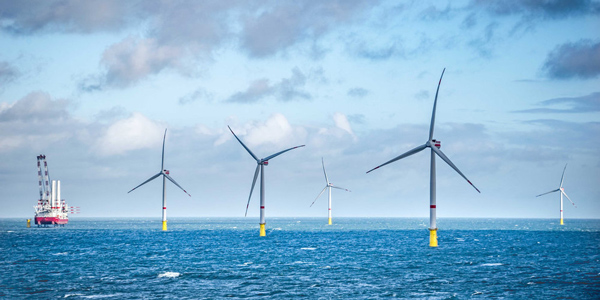Massachusetts lawmakers passed a sweeping climate bill Monday that would provide the state another path to reach net-zero carbon emissions by 2050.
The bill, which passed both the state House and Senate, still requires sign-off by Republican Gov. Charlie Baker, who recently released his own legally binding plan to achieve net-zero emissions in the same time frame.
It also comes just weeks after the state joined Connecticut, Rhode Island and D.C. in launching the Transportation and Climate Initiative Program (TCI-P), which aims to cut greenhouse gases from vehicles by 26% over the next decade and invest in cleaner transportation choices and public health improvements. (See NE States, DC Sign MOU to Cut Transportation Pollution.)
The new law will require Massachusetts to reduce emissions to 50% below 1990 levels by 2030, 75% by 2040 and 85% by 2050.
Emissions targets must be reviewed every five years to ensure the state is making sufficient progress. The bill additionally establishes mandatory emissions limits for electricity, transportation, commercial and residential heating and cooling, industrial processes, and natural gas distribution and service.
Dan Dolan, president of the New England Power Generators Association, said the climate bill and Baker’s plan “dovetail largely together.” Both efforts show that states are starting to do “more than pay lip service” to electrification on an economy-wide basis, he said.
The bill also calls for utilities to procure an additional 2,400 MW of offshore wind power, raising the state’s total to 5,600 MW.
Francis Pullaro, executive director for RENEW Northeast, said his organization’s members are not just renewable energy developers; “they’re environmental advocates and I think, generally speaking, they’re extremely pleased with this bill.”
“It’s an attention-getter for the offshore wind sector,” Pullaro said. “With the climate ambitions that Massachusetts has, it’s going to need offshore wind; it’s going to need small solar and it’s going to continue to need to take advantage of the land-based wind and larger solar potential in the region, as well as the transmission to get some of these renewables, including offshore wind, from remote areas to the load centers.”
Dolan expressed disappointment that the bill contains an OSW procurement — but “not because offshore wind is a bad resource.” Instead, he wants to see how the first set of offshore projects perform and allow the region “to then make some of the market changes necessary to be able to finance the next wave of new energy through the market, rather than continued reliance on the long-term contracts.”
“That’s probably the single biggest element that was of concern to us in the legislation itself,” Dolan said.
‘No Way Around It’
Tamara Small, CEO of NAIOP Massachusetts, which represents commercial real estate developers, said her organization is troubled by a bill provision that allows for the development and adoption of “opt-in” building codes for municipalities that could require buildings to have net-zero emissions. Small said the bill’s language is “unclear” about which cities and towns would opt-in and when they would do it. She added that the bill “does not define what net-zero means, and interestingly net-zero is a term that means very different things to very different people.”
“We don’t know what building types will be affected, whether it be all types of real estate or segments,” Small said. “We don’t know if the technology even exists to get to the goals that may be included in this undefined term. We know that certain properties have really struggled to get to net-zero, particularly large office buildings and lab buildings. Right now, we have a global health pandemic that has resulted in a significant impact on the entire commercial real estate industry and the greater economy.”
Small said NAIOP is “very concerned” the bill creates uncertainty for the building permit process and the cost of construction, “so we are very much opposed to the language in the bill right now.”
To be clear, she said, NAIOP recognizes the effects of climate change, and its 1,700 members are “supportive of net-zero within a timeline that makes sense,” but “one year is not that timeline.”
“We have regulations getting ahead of technology, in addition to the fact that it’s just so unclear what’s going to be required in the industry right now,” Small said. “I think for real estate developers, and the greater real estate industry, predictability and certainty are critical, and this [bill] does not provide that.”
Jacob Stern, deputy director for the Massachusetts chapter of the Sierra Club, likened the builders’ reaction to reaching net-zero emissions to the past attitude of automakers toward manufacturing electric vehicles.
“I kind of see it as something a little similar,” Stern said. “We know that we cannot continue to do gas infrastructure. … It’s going to affect the building sector. It’s a situation where we’re either going to have to start rethinking about how we construct buildings and how we put a gas infrastructure in buildings, or we’re not going to be able to effectively fight climate change. It’s just a part of the puzzle. There’s no way around it.”




